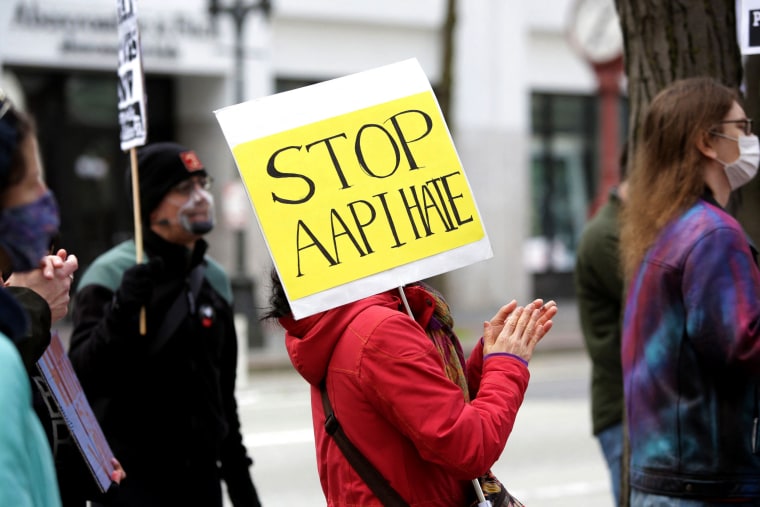Asian Americans and Pacific Islanders have growing concerns about their safety amid attacks that have targeted them during the pandemic, a new survey shows.
The Pew Research Center survey, released Wednesday, revealed that roughly one-third of Asian Americans feared someone might threaten or physically attack them, a larger share than all other races. More than 80 percent say violence against them is increasing.
Researchers conducted the survey earlier this month, following the March 16 shooting at three Atlanta-area spas that claimed the lives of eight people, including six Asian women. The interviews, conducted in both English and Spanish, included responses from more than 5,100 adults across races, including 352 Asian Americans.
Pew found that 45 percent of Asian Americans experienced one of five specific offensive incidents, including being told to go back to their home country, people acting uncomfortable around them or being blamed for the coronavirus. Additionally, 32 percent noted that “someone has expressed support for them since the start of the pandemic.”
While the vast majority of Asian Americans felt that violence against their community is increasing, roughly 56 percent of the general American adult population felt the same increase in violence.
When asked about the reasons for the violence, around 20 percent of Asian American respondents cited former President Donald Trump and his “China virus” rhetoric for the rise in attacks. Others attributed it to broader racism against Asian Americans and the impacts of Covid-19 on the nation.
While fear is now prevalent among the Asian American population, the survey also showed that Asian Americans reported discrimination at similar rates before the pandemic. In February 2019, 76 percent of Asian American adults said they had personally experienced discrimination or unfair treatment because of their race or ethnicity. This year, 73 percent of Asian Americans reported discrimination, according to Pew.
Janelle Wong, a professor of American studies at the University of Maryland, College Park, said the perceived increase in violence in the context of the steady, relatively unchanged reporting of discrimination brings up an important distinction between raising awareness and stoking fear in the media.
“Stoking fear can be problematic in that it may lead us to focus our energies on the wrong targets,” Wong told NBC Asian America. “If the problem is that racial discrimination against Asian Americans has always been with us and is not new or surging, that calls for a long-term approach — one that involves education and investment in community and racial justice organizations that provide consistent support.”
She added that the data show that anti-Asian bias did not necessarily begin with Trump, but his rhetoric likely exacerbated it. Attacks on Asian Americans, she said, have been “happening all along with attacks on other communities of color.” While it may be linked to the former president’s policies and rhetoric, the issue goes far deeper and is more widespread than his administration.
Rep. Ted Lieu, D-Calif., who’s been outspoken about the attacks on Asian Americans during the pandemic, said the results were eye-opening but not surprising given the emotions he’s seen from his own loved ones.
“My parents have called me and asked me questions like should they go to the supermarket, because they're scared,” Lieu said.
The data, he said, served as proof that while some in Congress claim, as Rep. Kevin McCarthy, R-Calif., did last year, that “there is no kitchen in America that thinks this is the priority,” in regard to anti-Asian hate, many Americans are concerned with their public safety.
"In that statement, [McCarthy] apparently is excluding many Asian American families," Lieu said. "He has a Pew Research report that shows there is widespread concern among Americans about hate incidents and hate crimes."
Lieu pointed out that several new pieces of legislation have been proposed to mitigate the anti-Asian violence. Among them is the Stop Hate Crimes Act, which he is sponsoring, that would change the standard for federal hate crimes to allow prosecutors to charge a hate crime if the victim’s protected characteristic was a contributing motivating factor in the defendant's actions, not just the primary factor.
Karthick Ramakrishnan, associate dean of the University of California, Riverside School of Public Policy and founder of data and policy nonprofit AAPI Data, previously explained that the persistence of attacks on Asian Americans after Trump’s tenure shows how deep racism in the U.S. goes. He cited 9/11 and reactions to the attacks as a “critical factor in increasing the market share for hate” and “mainstreaming hate and white nationalism.”
Ramakrishnan added that the election of Barack Obama, as the nation's first Black president, prompted "a dramatic increase" in people joining hate groups and a rise in racial resentment that has continued until today. Combatting this will require a multifaceted approach, he said, including more investment and adequate resources in communities of color, so their stories can be told and humanized.
“It's just going to take a lot for that to wind down,” he said. “Just because Trump is gone does not mean that the forces that are pulling us apart, and the forces of white nationalism, have gone away.”
